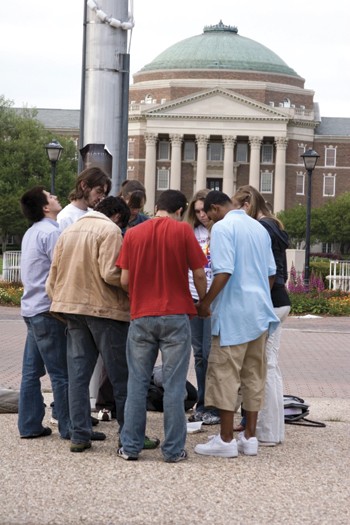
A group of SMU students hold an impromptu prayer circle at the Flagpole on Monday in response to the shootings at Virginia Tech. (Christina Parrish)
SMU officials say they are prepared if an incident like the one at Virginia Tech happens here. As recently as December 2006 an active shooter scenario exercise was held according to Lee Arning, the director of emergency preparedness and business continuity.
But the shootings at the Blacksburg, Va., campus have changed things.
“Today’s event has rewritten the rulebook,” Arning said in an interview Monday evening.
A gunman killed 32 people at Virginia Tech in the deadliest shooting rampage in United States history. The victims were massacred in two attacks two hours apart on opposite sides of the school’s campus, with Tech’s police force unable to warn anyone before the carnage ensued. It ended with the gunman committing suicide – making the final death toll 33.
Arning said he would attend a meeting Tuesday morning with other administrators to discuss the incident and its ramifications for the SMU community.
At SMU, in the event of such an incident, the building managers would be responsible for either locking down their buildings or taking other measures necessary to keep its occupants safe according to Arning. They could also pass along information through a network of people within each building.
The next wave of communication would come electronically: via e-mail, the official university Web site and phone tree messages. Any messages could also be announced on an intercom system; however, there is not a central intercom system and not every building on campus has one to begin with.
One thing that will not happen, Arning said, is police officers driving around the campus notifying people over speakers or bullhorns. He said that would make the police cars and officers targets.
SMU has emergency “Lockdown/Take Cover” guidelines that Arning said he discusses during the annual campus fire drills at buildings.
The guidelines say if a person perceives a threat of violence to dial 911 immediately or call SMU police at (214) 768-3333. It adds that evacuation alarms should not be sounded.
It says to close, lock and barricade doors to reduce the potential risk of a violent person reaching the area where people are. The guidelines say the best way to secure oneself is by not moving around, crouching down and either getting out of sight or getting low on the floor. It says to remain silent because studies have shown that shooters will fire at things that move or make sounds. The guidelines also say to be prepared to remain in a lockdown state for an extended period of time.
It will be safe to leave only when police on the scene gives an “all clear” message.
“Your safety is dependent on compliance that may be uncomfortable for a little while,” Arning said.
Some Virginia Tech students told media outlets that the school failed to properly notify them of what was occurring and also accused the school of acting irresponsibly by not closing down the campus after the first shooting.
Arning said if there were a similar incident at SMU, the school would err on the side of caution and shut down the campus.
He said SMU PD, which would be the first responders to any incident on campus, has attended multi-day response training camps and would be ready for such events. Arning said it is likely SMU PD will go through more training after the events at Virginia Tech.
“Their training is a strong part of their job,” Arning said.
The active shooter exercise held in December 2006 is another part of that training.
Representatives of Highland Park PD, University Park PD, Dallas SWAT and SMU PD attended along with UP public affairs, SMU emergency management and public affairs.
Arning said the scenario was based on research of previous incidents and allowed the different groups to have an idea of what it would be like to work together. At various points during the scenario, the group would stop and each agency would discuss what they would be doing at that point and how they could do their job better.
“Everything is critically integrated,” Arning said.
After the scenario concluded the agencies discussed opportunities for improvement. Arning said the exercise was not the first one for the school, and credited SMU for continuing to refine its response to different events.
He said meetings and discussions occurred twice already this semester in response to the incident at the Laura Lee Blanton Building with the suspicious envelope that wound up containing cooking powder and the meningitis infection that was on campus shortly before Spring Break.








